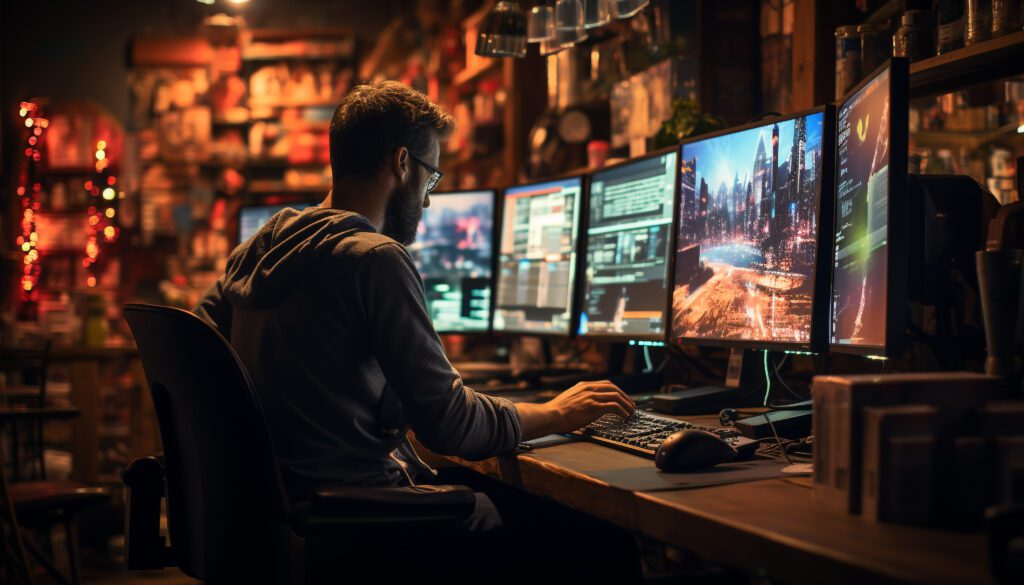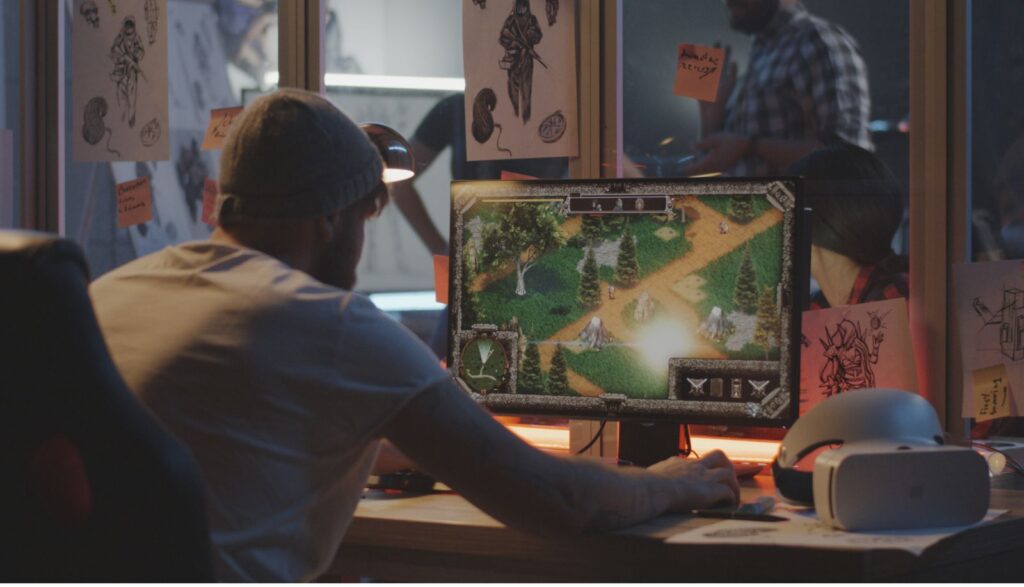In the rapidly evolving world of digital entertainment, the demand for high-quality, engaging video games is always high. Whether you’re an established company looking to expand into the gaming market or a startup with a groundbreaking idea, knowing how to hire a game development team is crucial to your success.
However, this process may not be as easy as it seems – there are many aspects to consider, each equally important as the next. So let’s present you with a step-by-step guide to help you navigate the critical process of hiring a game development team.
Read also: 5 gaming trends in 2024: a look into the future and beyond
Before hiring a game development team: define your vision and requirements!

Before start thinking about hiring a game development team, it’s essential to clearly define your game’s vision, scope, and requirements.
Begin by identifying the game genre, as this will influence the type of expertise you’ll need. Decide whether your game will be for PC, console, mobile, or cross-platform, as each platform has its own set of technical requirements and user expectations.
After that, outline the must-have features and mechanics, such as multiplayer capabilities, in-game purchases, complex AI, or immersive storytelling and determine the visual style of your game, whether it will be 2D or 3D, realistic or stylized.
Finally, establish a realistic budget and development timeline, considering the costs of salaries, software, hardware, and potential outsourcing. Having this clear vision will help you communicate your needs effectively and attract the right talent who are passionate about your project.
Roles in a game development team
To better hire a game development team, we must first understand the various roles we can find in one, each with specific responsibilities.
- Game designers are responsible for the core concept, game mechanics, story, and user experience, creating detailed design documents that serve as the blueprint for development.
- Developers or programmers write the code to bring the game to life, with specializations including gameplay programming, graphics programming, AI, and network programming.
- Artists create the visual elements, including characters, environments, and animations, and may include concept artists, 3D modelers, texture artists, and animators.
- Sound designers produce audio elements, such as sound effects, music, and voice acting, which can significantly enhance the gaming experience.
- QA testers playtest the game to identify bugs and ensure quality, providing critical feedback on gameplay, usability, and overall experience.
- Project managers oversee the development process, ensuring the project stays on track, within budget, and meets quality standards.
Depending on your game’s complexity, you might also need specialists in areas like VR/AR, AI, or multiplayer networking.
If you defined your vision, as we mentioned before, you will have a clear idea of which roles will be more important for your projects, and make your hiring decisions based on that.
Read also: The 6 stages of the game development cycle
In-house or freelance? How to build your own game development team
Deciding whether you want to build an in-house team or hire freelancers is always a crucial point in any game development.
An in-house team provides better control, cohesion, and direct communication but can be costlier and time-consuming to assemble. This option is ideal for long-term projects where consistent collaboration is essential.
Freelancers offer flexibility and cost savings, making them useful for short-term projects or specific tasks. However, managing a group of freelancers can be challenging, and they may lack the commitment and consistency of a full-time team.
In both these cases, you’ll probably have to spend some time searching for the right talent for your project. Again, your initial vision will be your guide in this search.
To find the right talent, leverage various platforms and networks. Use job boards and freelance sites like LinkedIn and Upwork, being specific in your job postings to attract the right candidates.
Attend industry events and conferences such as gaming conventions, expos, and meetups to network with potential candidates and engage with online communities on Reddit, Discord, and specialized forums where game developers congregate, including platforms like Unity and Unreal Engine forums.
You can also ask for recommendations from industry contacts or employees, as personal recommendations often lead to finding reliable and talented individuals.
Consider partnering with universities and colleges that have strong game development programs is another great option, as internships can bring fresh talent into your team.

Evaluation and integration of candidates
When evaluating candidates to hire a game development team, consider both their technical skills and cultural fit. Review their previous work to see if it aligns with your project’s style and quality, looking for a proven track record in similar projects.
Assess their skills in relevant programming languages, tools, and technologies, such as familiarity with Unity or Unreal Engine, experience with C++, and proficiency in 3D modeling software like Blender or Maya.
Look for innovative thinkers who can tackle challenges creatively, evaluating their ability to come up with unique solutions and ideas. Ensure they can work well in a team and communicate effectively, as strong interpersonal skills and a collaborative mindset are crucial in a team environment.
Conduct thorough interviews, including technical tests and practical assignments, to gauge their capabilities, using coding challenges, design tasks, or art tests to evaluate their skills in a real-world context.
Once you’ve assembled your team, focus on smooth onboarding and integration. Provide detailed project documentation, including design documents, technical specifications, and development guidelines, as clear and accessible documentation helps prevent misunderstandings and keeps everyone on the same page.
Outsourcing a game development team
Building your own team can be a complex, albeit rewarding task. But a very common practice in the industry is to outsource part of the project to more established and experienced companies, with specialized teams and professionals.
Outsourcing studios, like us here at Main Leaf, can handle complete projects efficiently, offering expertise and resources that might be unavailable in-house.
In fact, outsourcing game development has become a viable and often essential strategy for many companies – since it can provide access to specialized skills, reduce costs, and accelerate project timelines.
By outsourcing, companies can avoid the expenses associated with hiring, training, and maintaining an in-house team and significantly reduce costs. This includes savings on salaries, benefits, office space, and equipment.
It provides access to a global talent pool, allowing companies to find experts with specialized skills that might not be available locally. This can lead to higher quality and more innovative game development.
Selecting the right outsourcing partner is critical to the success of your project. Start by researching potential outsourcing studios or freelancers. Look for companies with a proven track record in game development, for example, ideally in the same genre or platform as your project.

Hire a game development team you can trust today: Main Leaf
Hiring a game development team is a significant step toward bringing your vision to life. By defining your needs, choosing the right talent, and fostering a collaborative environment, you can set the foundation for a successful game development journey.
And if outsourcing sounds like a good idea to you, why not get in contact with us here at Main Leaf? We have more than 10 years of experience in the game development industry, with successful games developed across many platforms!
So reach us today so we can start helping you with your project. Check out our blog for many other articles relating to the video game industry.

